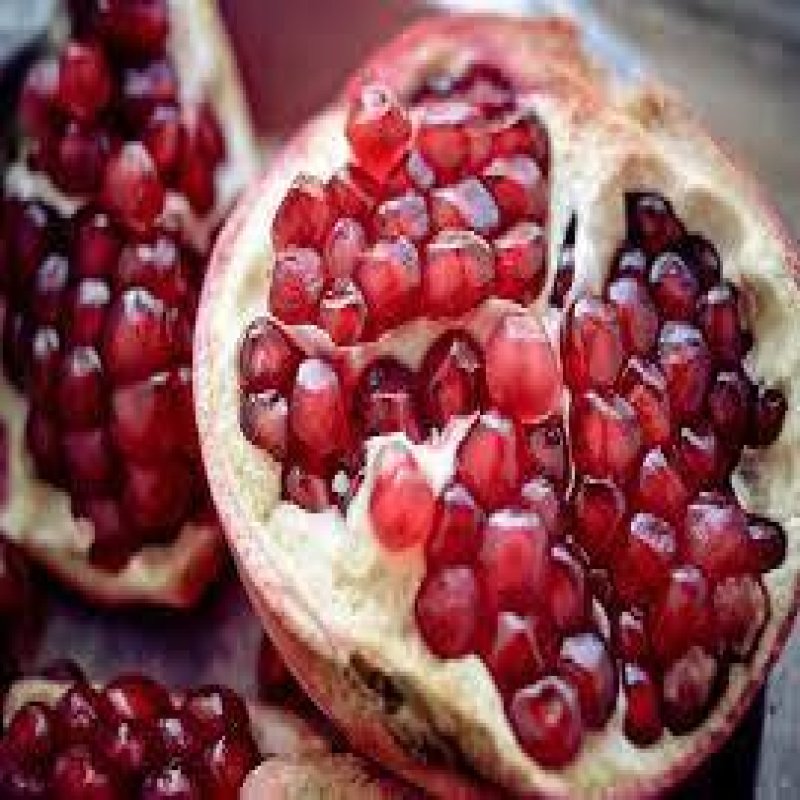
Antioxidants prevent or repair the effects of free radicals. Free radical damage leads to a host of age-related illnesses and disorders, such as wrinkles, age spots, and even diabetes and heart disorders. Is there a fruit that can prevent aging? Maybe not! But pomegranate comes close. Pomegranates contain a high level of antioxidants, which provide the body with defense against aging.
Read on to know more about the health benefits of pomegranates!
Pomegranate is a thick-skinned and seedy fruit that derives its name from the French word "pomegranate,” or seeded apple. It is believed to have originated in Iran and was brought to Egypt in 1600 BC. Pomegranates were not only considered an important food source but were also widely used for their medicinal properties. Even during those times, pomegranates were popular due to their depiction in Egyptian paintings and tombs.
Did You Know?
– One of the healthiest foods you can eat is pomegranates.
– Pomegranates delay the signs of aging.
– It is considered as a symbol of fertility and prosperity in some cultures.
– It is used in preparing traditional Persian recipes such as fesenjan.

Also called “raman” in Arabic, “grenade” in French, and “anaar” in Hindi, pomegranate is both nutritious and delicious. The ancient Egyptians believed pomegranates offered eternal life; hence, they buried the dead along with pomegranates. The Greeks opened the fruit as a part of their wedding celebration, while the Chinese ate candied pomegranate seed, ushering in good luck and fortune.
/__opt__aboutcom__coeus__resources__content_migration__simply_recipes__uploads__2013__11__how-to-cut-pomegranate-horiz-a-1800-f103ea8f1a9d49c1995f28eaa50d7a12.jpg)
Health Benefits of Pomegranates
This fruit is power-packed with a variety of essential nutrients, such as vitamins C and K, copper, potassium, folate, manganese, thiamin, pantothenic acid (vitamin B5), fiber, and pyridoxine, plus the antioxidants' tannin, anthocyanin, ellagic acid, and punicalagin.
Pomegranates provide countless health benefits. Several doctors suggest eating pomegranates to regain strength after a long illness, as they are very useful in maintaining healthy and effective blood circulation. Other health benefits include being a great cure for stomach disorders, heart-related problems, dental problems, cancer, osteoarthritis, diabetes, and anemia.
Consumption of pomegranate syrups protects babies from brain damage incurred during birth. Thus, we can say that pomegranates help our body in many ways, from curing stomach problems to improving erectile dysfunctions and many more.
Let’s explore some of the amazing health benefits of pomegranates in detail.
Boosts Immunity
Pomegranate is a good source of vitamin C. Consumption of fruits rich in vitamin C helps the body develop the ability to combat infections.

Good For Heart
Pomegranate juice contains certain ellagitannin compounds, such as granatin B and punicalagin, in abundance. Punicalagin and tannins can be effective in reducing the risk of heart disease by scavenging harmful free radicals from the human body. Also, the antioxidant components in this fruit help keep bad cholesterol from accumulating and, thus, keep the arteries clear of any clots.

Prevents Cancer
Pomegranates contain influential levels of antioxidants called flavonoids. These flavonoids are effective in counteracting various cancer-causing free radicals. People who face a high risk of prostate and breast cancer should drink pomegranate juice, as it will help them reduce the risk of developing cancer. Regular consumption of pomegranates can reduce PSA (prostate-specific antigen) levels in the body and aid in the fight against existing cancer cells as well.

Click here to read about breast cancer!
Promotes Digestion
It is a good source of soluble and insoluble dietary fibers, which assist in smooth digestion and proper bowel movements. Pomegranate peel, bark, and leaves can help cure diarrhea or stomach disorders occurring due to digestive issues. Drinking tea made from the leaves of this fruit also helps in curing digestive problems.

Treats Anemia
Pomegranates help to maintain healthy blood flow. It provides an adequate supply of iron to the blood, thereby reducing symptoms of anemia like exhaustion, dizziness, weakness, and hearing loss.

Other Benefits
Studies suggest that the high concentration of antioxidants in the juice can stall the progression of Alzheimer’s disease and protect memory. They help control aging problems like wrinkles and provide glowing and youthful skin. Other than this, it can help women overcome depression symptoms during menstruation, especially post-menopausal depression.
Best Ways to Consume Pomegranates
Pomegranate contains bright red pods known as arils. Arils are the juice-filled balls surrounding a small seed. The seed is edible, so you can eat it or spit it out according to your preference.
Additionally, you can add pomegranate arils to your yogurt, custards, and cereal as well. Pomegranate juice is readily available at many stores, or you can juice your own.

The advantages and health benefits of pomegranates are countless, so get your hands on some of these juicy fruits and reap the benefits.
Disclaimer– The enzymes present in pomegranate can hinder the functioning of certain enzymes present in your liver. Consult your doctor before consuming this fruit or its juice, if you are on any specific medication for liver disorders. Though it fights diabetes, pomegranate is a preventive food. Since pomegranate has a high content of sugar, stay away from it if you are suffering from diabetes.
Nutritional Information
100g of pomegranates provides 83 Calories, Carbohydrates – 19g (Dietary Fiber – 4g, Sugar – 14g), Protein – 1.7g, Fat – 1.2g, Sodium – 3mg
And a percentage daily value of Vitamin A – 0%, Vitamin C – 17%, Iron – 2%, Calcium – 1% (based on a 2000-calorie diet).


.png)


